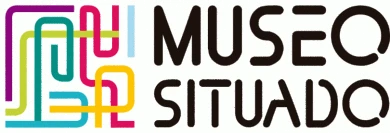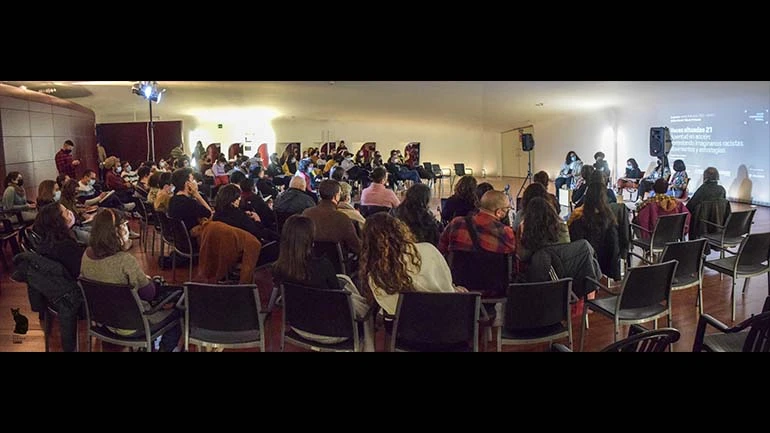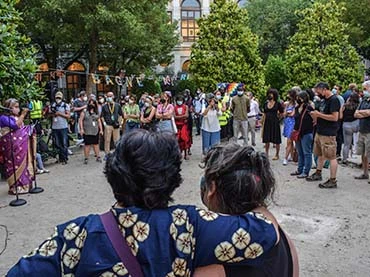Situated Voices 21
Youth in Action: Responding to Racist Imaginaries. Movements and Strategies

Held on 18 Mar 2022
The Red de Estrategias Antirrumores de la Región de Madrid (The Network of Anti-Rumour Strategies in the Madrid Region, RAMA), founded in 2019, is made up of public and private entities working jointly to share knowledge and experiences that allow alternative narratives to racist and xenophobic speech to be created.
Driving forward anti-rumour strategies in an array of contexts and territories in the Madrid region, RAMA’s work centres on memory, activism and imaginaries to open dialogue around possible scenarios and strategies that destabilise supports of racism.
What do we understand by racism and in what ways does it affect racialised people? What role does racism play in the multiple forms of oppression that cross through certain bodies in relation to gender, race, class, administrative status, and so on? Are we responding to racism? How do we build and maintain anti-racism? What is the role of the migrant political subject and young people in the anti-racist struggle? Where do we situate the demands, proposals and collective agendas that arise from migrant and anti-racist communities?
This edition of Situated Voices, convened from RAMA and in collaboration with Museo Situado, seeks to reflect through young migrant and anti-racist activists to collectively imagine multi-faceted, creative, political and disobedient processes allowing anti-racism to be incorporated into the heart of struggles and thereupon to examine this intersection with other issues around education, participation in the political community, heteromormativity, climate justice, etc.
Participantes
Fátima Ezzamouri is a political scientist, jurist and social activist who holds an MA in Social Sciences from the Carlos III University in Madrid. Her work focuses on investigating the ethnic and racial discrimination in the labour market and she is a specialist in social stratification. She has developed European mobility projects inside the Erasmus+ framework, as well as coordinating the Asociación Sobre los Márgenes (Association On the Margins) in its aim to ensure the socio-educational integration of young people at risk of exclusion.
Yeison F. García López is a political scientist, activist and cultural manager who identifies himself as Afro-Colombian and Afro-Spanish. He earned a degree in Political Sciences and an MA in Research Methodology in Social Sciences: Innovations and Application from the Complutense University of Madrid. He is coordinator of the legislative popular initiative for the regularisation of migrant people with irregular status, on behalf of the movement #RegularizacionYa (#RegularisationNow).
Julissa Jáuregui is a political scientist with an MA in International Cooperation. She is a specialist in migration and citizen participation for Alianza por la Solidaridad-Action Aid, where she coordinates projects with associations led by migrant women for their recognition as political subjects.
Nayare Montes holds a degree in Fine Arts from the Complutense University of Madrid, with part of her studies completed in Guadalajara (Mexico). She has worked intermittently with Ayllu, a contemporary creation and activism collective whose work centres around issues of migration, anti-racism, coloniality and sexual dissidence. She is a transdisciplinary trans artist, a visual, textual and multi-dimensional poet: performer, DJ, graphic designer, curator of experiences fusing festive culture, sexual diversity and active teaching through the body and from trans epistemology.
Katherine Muñoz Tirano holds a degree in Social and Cultural Anthropology, specialising in gender and feminist studies, and is an editor and community catalyst via social theatre. Her professional career, and as an activist, has led her to share her knowledge and concerns with Latin American refugee women, exiles and migrant women, particularly from Colombia, with whom she has worked to construct historical memory and peace from theatre, creative writing and participatory research-action, and with a focus on human rights, respect and the defence of diversity.
Coordinated by
Red de Estrategias Antirrumores de la Región de Madrid (RAMA)
Organised by
Red de Estrategias Antirrumores de la Región de Madrid (RAMA), GRIGRI and Museo Situado
Collaboration
Madrid City Council
Organised by

Organised by

Collaboration




Más actividades

Difficulty. Forms and Political Effects of Deviation in Writing and Contemporary Art
23 February – 14 December 2026 – Check programme
Difficulty. Forms and Political Effects of Deviation in Writing and Contemporary Art is a study group aligned towards thinking about how certain contemporary artistic and cultural practices resist the referentiality that dominates the logics of production and the consumption of present-day art. At the centre of this proposal are the concepts of difficulty and deviation, under which it brings together any procedure capable of preventing artistic forms from being absorbed by a meaning that appears previous to and independent from its expression. By ensuring the perceptibility of their languages, difficulty invites us to think of meaning as the effect of a signifying tension; that is, as a productive and creative activity which, from the materiality of art objects, frees aesthetic experience from the representational mandate and those who participate in it from the passiveness associated with tasks of mimesis and decoding.
The economy of the referential norm translates the social logic of capitalism, where insidious forms of capturing subjectivity and meaning operate. In the early 1980s, and adopting a Marxist framework, poet Ron Silliman highlighted how this logic entailed separating language from any mark, gesture, script, form or syntax that might link it to the conditions of its production, rendering it fetichised (as if without a subject) and alienating its users in a use for which they are not responsible. This double dispossession encodes the political strategy of referential objectivity: with no subject and no trace of its own consistency, language is merely an object, that reality in which it disappears.
The political uses of referentiality, more sophisticated today than ever before, sustain the neoliberal-extractivist phase of capitalism that crosses through present-day societies politically, economically and aesthetically. Against them, fugitive artistic practices emerge which, drawing from Black and Queer studies and other subaltern critical positions, reject the objective limits of what exists, invent forms to name what lies outside what has already been named, and return to subjects the capacity to participate in processes of emission and interpretation.
Read from the standpoint of artistic work, the objective capture of referentiality may be called transparency. Viewed from a social contract that reproduces inequality in fixed identity positions, transparent in this objectivity are, precisely, the discourses that maintain the status quo of domination. Opposite the inferno of these discourses, this group aims to collectively explore, through deviant or fugitive works, the paradise of language that Monique Wittig encountered in the estranged practices of literature. For the political potency of difficulty — that is, its contribution to the utopia of a free language among equals — depends on making visible, first, its own deviations; from there, the norm that those deviations transgress; and finally, the narrowness of a norm which in no way exhausts the possibilities ofsaying, signifying, referring and producing a world.
From this denouncement of referential alienation, fetishisation and capture, Difficulty. Forms and Political Effects of Deviation in Writing and Contemporary Art turns its attention to the strategies of resistance deployed by contemporary artists and poets. Its interest is directed towards proposals as evidently difficult or evasive as those of Gertrude Stein, Lyn Hejinian, Theresa Hak Kyung Cha, Kameelah Janan Rasheed, Kathy Acker, María Salgado and Ricardo Carreira, and as seemingly simple as those of Fernanda Laguna, Felix Gonzalez Torres and Cecilia Vicuña, among other examples that can be added according to the desires and dynamics of the group.
The ten study group sessions, held between February and December, combine theoretical seminars, work with artworks from the Museo Reina Sofía’s Collections and exhibitions, reading workshops and public programs. All these formats serve as spaces of encounter to think commonly about certain problems of poetics — that is, certain political questions — of contemporary writing and art.
Difficulty. Forms and Political Effects of Deviation in Writing and Contemporary Art inaugurates the research line Goodbye, Representation, through which the Museo Reina Sofía’s Studies Directorship seeks to explore the emergence of contemporary artistic and cultural practices which move away from representation as a dominant aesthetic-political strategy and redirect their attention toward artistic languages that question the tendency to point, name and fix, advocating instead for fugitive aesthetics. Over its three-year duration, this research line materializes in study groups, seminars, screenings and other forms of public programming.

Institutional Decentralisation
Thursday, 21 May 2026 – 5:30pm
This series is organised by equipoMotor, a group of teenagers, young people and older people who have participated in the Museo Reina Sofía’s previous community education projects, and is structured around four themed blocks that pivot on the monstrous.
This fourth and final session centres on films that take the museum away from its axis and make it gaze from the edges. Pieces that work with that which is normally left out: peripheral territories, unpolished aesthetics, clumsy gestures full of intent. Instead of possessing an institutional lustre, here they are rough, precarious and strange in appearance, legitimate forms of making and showing culture. The idea is to think about what happens when central authority is displaced, when the ugly and the uncomfortable are not hidden, when they are recognised as part of the commons. Film that does not seek to be to one’s liking, but to open space and allow other ways of seeing and inhabiting the museum to enter stage.

Intergenerationality
Thursday, 9 April 2026 – 5:30pm
This series is organised by equipoMotor, a group of teenagers, young people and older people who have participated in the Museo Reina Sofía’s previous community education projects, and is structured around four themed blocks that pivot on the monstrous.
The third session gazes at film as a place from which to dismantle the idea of one sole history and one sole time. From a decolonial and queer perspective, it explores films which break the straight line of past-present-future, which mix memories, slow progress and leave space for rhythms which customarily make no room for official accounts. Here the images open cracks through which bodies, voices and affects appear, disrupting archive and questioning who narrates, and from where and for whom. The proposal is at once simple and ambitious: use film to imagine other modes of remembering, belonging and projecting futures we have not yet been able to live.

Remedios Zafra
Thursday March 19, 2026 - 19:00 h
The José Luis Brea Chair, dedicated to reflecting on the image and the epistemology of visuality in contemporary culture, opens its program with an inaugural lecture by essayist and thinker Remedios Zafra.
“That the contemporary antifeminist upsurge is constructed as an anti-intellectual drive is no coincidence; the two feed into one another. To advance a reactionary discourse that defends inequality, it is necessary to challenge gender studies and gender-equality policies, but also to devalue the very foundations of knowledge in which these have been most intensely developed over recent decades—while also undermining their institutional support: universities, art and research centers, and academic culture.
Feminism has been deeply linked to the affirmation of the most committed humanist thought. Periods of enlightenment and moments of transition toward more just social forms—sustained by education—have been when feminist demands have emerged most strongly. Awareness and achievements in equality increase when education plays a leading social role; thus, devaluing intellectual work also contributes to harming feminism, and vice versa, insofar as the bond between knowledge and feminism is not only conceptual and historical, but also intimate and political.
Today, antifeminism is used globally as the symbolic adhesive of far-right movements, in parallel with the devaluation of forms of knowledge emerging from the university and from science—mistreated by hoaxes and disinformation on social networks and through the spectacularization of life mediated by screens. These are consequences bound up with the primacy of a scopic value that for some time has been denigrating thought and positioning what is most seen as what is most valuable within the normalized mediation of technology. This inertia coexists with techno-libertarian proclamations that reactivate a patriarchy that uses the resentment of many men as a seductive and cohesive force to preserve and inflame privileges in the new world as techno-scenario.
This lecture will address this epochal context, delving into the synchronicity of these upsurges through an additional parallel between forms of patriarchal domination and techno-labor domination. A parallel in which feminism and intellectual work are both being harmed, while also sending signals that in both lie emancipatory responses to today’s reactionary turns and the neutralization of critique. This consonance would also speak to how the perverse patriarchal basis that turns women into sustainers of their own subordination finds its equivalent in the encouraged self-exploitation of cultural workers; in the legitimation of affective capital and symbolic capital as sufficient forms of payment; in the blurring of boundaries between life and work and in domestic isolation; or in the pressure to please and comply as an extended patriarchal form—today linked to the feigned enthusiasm of precarious workers, but also to technological adulation. In response to possible resistance and intellectual action, patriarchy has associated feminists with a future foretold as unhappy for them, equating “thought and consciousness” with unhappiness—where these have in fact been (and continue to be) levers of autonomy and emancipation.”
— Remedios Zafra

27th Contemporary Art Conservation Conference
Wednesday, 4, and Thursday, 5 March 2026
The 27th Contemporary Art Conservation Conference, organised by the Museo Reina Sofía’s Department of Conservation and Restoration, with the sponsorship of the Mapfre Foundation, is held on 4 and 5 March 2026. This international encounter sets out to share and debate experience and research, open new channels of study and reflect on conservation and the professional practice of restorers.
This edition will be held with in-person and online attendance formats, occurring simultaneously, via twenty-minute interventions followed by a five-minute Q&A.

